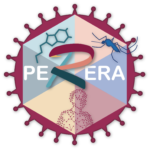The research of Dr. Rushika Perera’s laboratory in the Center for Vector-Borne Infectious Diseases (CVID), is focused on understanding the impact of cellular metabolism on the replication of mosquito- and tick-borne flaviviruses within their vertebrate hosts and Arthropod vectors. Specifically, we use a systems biology approach including metabolomics and proteomics combined with molecular virology, cell biology, biochemistry and structural biology to study flavivirus-host interactions. Similar to other positive strand RNA viruses, flaviviruses cause significant perturbations to the host metabolome to facilitate the formation of replication factories within specialized membrane structures. These structures are required for viral genome replication, assembly and egress. The host metabolome also fulfills the energy requirements for virus replication. Therefore, it is a key avenue to understand the dynamics of virus-host interactions and provides a novel avenue to identify targets for antiviral intervention. The goal of her research is to identify control points in cellular metabolic pathways that are required for virus replication, and evaluate these control points as novel targets for antiviral intervention.
The Perera Lab supports ‘Diversity’, practices ‘Equity & Inclusion’, ensures ‘Social Justice’.
The Perera Lab abides by Colorado State University’s Principles of Community.
research project
COVID-19: Developing platforms to test antivirals against SARS-CoV-2
The Perera lab (in collaboration with the Geiss Laboratory and the CSU OVPR) has mobilized testing of FDA-approved antiviral drugs that can be repurposed and rapidly driven into clinical trials, as well as new compounds that can be evaluated for efficacy against SARS-CoV-2. We are currently working with collaborators and partners from around the world to screen their drug and compound inventories.
view project
research project
Metabolite biomarkers of severe disease, resolution and therapeutic efficacy
We utilize Systems Biology based-metabolomics to develop small molecule biosignatures of severe disease. These biosignatures can be utilized for early detection and triaging of patients, to better assist clinical management of those at greater risk. They are also powerful indicators of disease resolution, recurrence and/or therapeutic efficacy.
view project
research project
Metabolic basis of mosquito-endosymbiont-virus interactions
These studies will identify biochemical pathways that change in the mosquito following infection with arboviruses, and how the endosymbiont Wolbachia used to control virus transmission in Aedes aegypti may be metabolically competing with the virus. Identifying these pathways that are integral to mosquito biology, provide a novel avenue to interfere with vector transmission of the virus.
view project
research project
Exploiting Vulnerabilities in Mosquito Metabolism for Prevention of Human Arboviral Transmissions
Zika, dengue, chikungunya and yellow fever viruses are spread by the same mosquito vector, Aedes aegypti. The Perera lab studies specific metabolic processes in mosquitos required for successful viral replication. These studies will identify metabolic “choke-points” that can be exploited to develop interventions and thus block mosquito-human viral transmission.
view project
research project
Metabolic basis of insecticide resistance
We are investigating the metabolic basis of insecticide resistance in Aedes aegypti. We have developed capability to trace the metabolites of insecticides and measure the enzymatic activities responsible for insecticide break down and development of resistance. These studies will assist in driving improvements in insecticide design and informed use of insecticides.
view project
Publications
G3BP1-dependent condensation of translationally inactive viral RNAs antagonizes infection.
Burke JM, Ratnayake OC, Watkins JM, Perera R, Parker R.Sci Adv. 2024 Feb 2;10(5):eadk8152. doi: 10.1126/sciadv.adk8152. Epub 2024 Jan 31. PMID: 38295168
The leader RNA of SARS-CoV-2 sequesters polypyrimidine tract binding protein (PTBP1) and influences pre-mRNA splicing in infected cells.
Altina NH, Maranon DG, Anderson JR, Donaldson MK, Elmegerhi S, St Clair LA, Perera R, Geiss BJ, Wilusz J.Virology. 2024 Apr;592:109986. doi: 10.1016/j.virol.2024.109986. Epub 2024 Jan 6. PMID: 38290414
High-Throughput SARS-CoV-2 Antiviral Testing Method Using the Celigo Image Cytometer.
St Clair LA, Chan LL, Boretsky A, Lin B, Spedding M, Perera R. J Fluoresc. 2023 Jun 13:1-10. doi: 10.1007/s10895-023-03289-x. Online ahead of print.PMID: 37310590
The buzz in the field: the interaction between viruses, mosquitoes, and metabolism.
Ratnayake OC, Chotiwan N, Saavedra-Rodriguez K, Perera R. Front Cell Infect Microbiol. 2023 Apr 26;13:1128577. doi: 10.3389/fcimb.2023.1128577. eCollection 2023. PMID: 37360524
The 22nd Annual Meeting of the Rocky Mountain Virology Association.
Ratnayake OC, Gendler P, Swartzwelter B, Keene A, Brehm AL, Quackenbush SL, Rovnak J, Perera R.Viruses. 2022 Dec 29;15(1):98. doi: 10.3390/v15010098.PMID: 36680138
more publications
People
Rushika Perera, Ph.D.
Lab Principal Investigator (PI)
Associate Professor
Director, Antiviral Testing Laboratory
Co-Director, Center for Metabolism of Infectious Diseases (C4MInD.org)
Kaitlyn Dirks
Undergraduate Student Researcher
CVMBS Undergraduate Research Award Recipient 2023-2024
contact information
Lab: Center for Vector-Borne Infectious Diseases room 130
Office: Center for Vector-Borne Infectious Diseases room 172
(970) 491-8611
[email protected]









